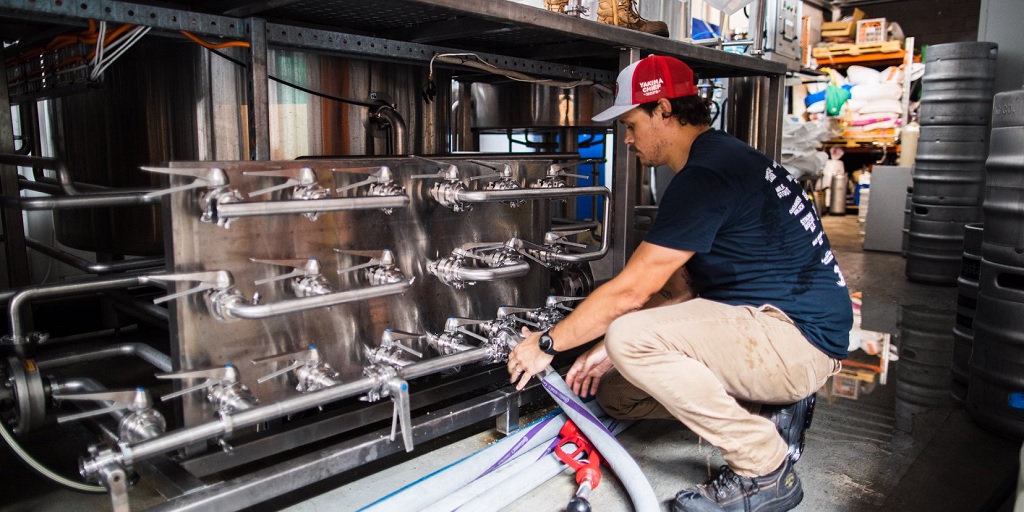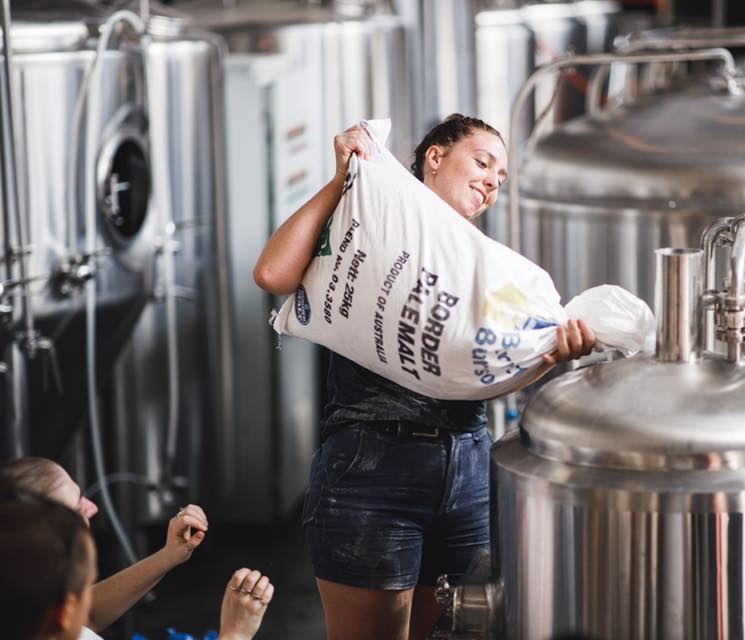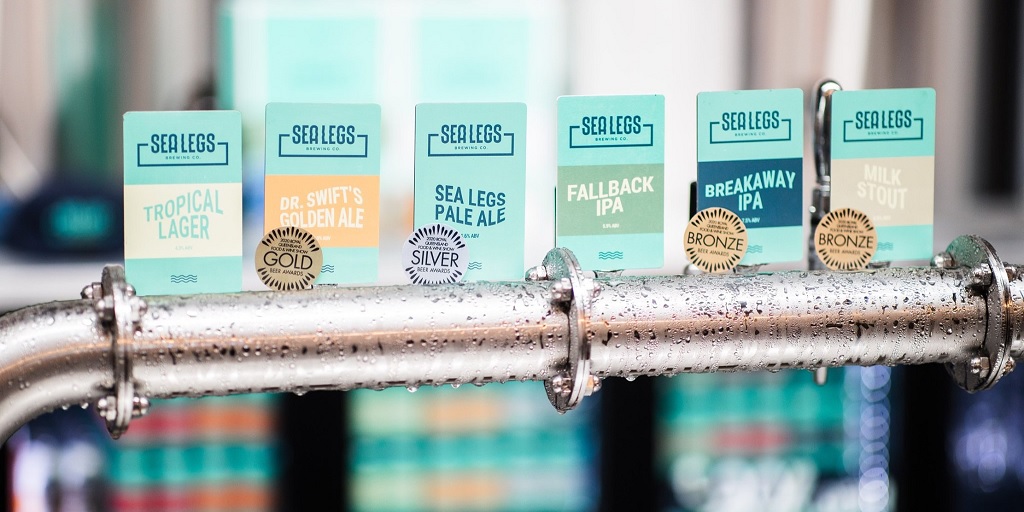
One Year On… Sea Legs Brewing

Sea Legs’ brewer Jon Fuchs
Brisbane’s Sea Legs Brewing faced a challenging start, but the CBD brewery has gone from strength to strength and has even brought in a new trainee brewer.
Co-founder and brewer Jon Fuchs told Brews News that despite the difficult beginnings, the support the Kangaroo Point brewery had received had allowed them to grow in both wholesale and retail and look at plans to expand.
“The biggest thing we’ve noticed is that business has been better than we ever projected. We’re really happy about that and the locals have been really supportive and we’ve had support outside of that as well,” Fuchs said.
But it wasn’t plain sailing even after opening. The team of business partners, which also includes Tim Wyatt, Dave Machin and Harvey McKibbon were previously chemical engineers, so they not only had to traverse the brewing but the business as well.
“We were all engineers and we were new to hospitality, wholesale distribution and beer,” said Fuchs.
“Getting amongst and learning about all that, I wouldn’t say it was a challenge but there was a learning curve. We were really fortunate that we had a lot of support from locals and the industry, and just people that support craft beer.
“We also had months of business drama, it was where a lot of our focus and stress was, and moving on from that was a big deal.”
But despite the tricky beginnings after complaints during the development application process and a neighbour with an axe to grind, the rest of the locals changed their minds once Sea Legs was opened.
“We’ve had people come in and say they were so sorry that they complained, but they absolutely love this place now. People make it what they think it is.
“Now, we definitely have a good crowd of regulars and locals are a big part of it.”
New brewer
In addition to learning the ropes, moving into wholesale and looking at expansion, Sea Legs has also done its part for industry development and brought in a trainee brewer.
Abby Heslop previously studied winemaking and started at Sea Legs Brewing in January.

Sea Legs trainee brewer Abby Heslop
“We definitely needed the help on the brewing side. Mark looks after in the cellar, and I was brewing at the time and juggling a handful of other things so we were keen to bring on some help, so Abby has come on to brew and it’s been going great,” said Fuchs.
Heslop said that her family was in winemaking, and own the Witches Falls Winery at Tambourine Mountain.
“I grew up there, and always helped dad in the holidays on the winery. When it came to choosing what I wanted to do, I didn’t really know, so I thought I’d give wine a shot. I liked the practical side of things,” Heslop explained.
She studied winemaking in Adelaide, doing a year exchange in California at UC Davis, completing work experience at Domaine Chandon in the famous Napa Valley, but Heslop still felt the call of beer.
“I graduated at the end of last year, and lots of my friends were going into the wine industry, but I was still interested in beer and wanted to do my own thing.
“My dad and I had done a lot of homebrews, and going to America there were so many breweries and beer there. I’m also a Queensland girl and wanted to head back up here from South Australia.”
A fortuitous meeting between the Witches Brew business development manager and the team at Sea Legs Brewing led to the introduction, and Jon Fuchs realised he’d found the right person for their growing team.
“If you organically meet someone and you can sense that brewing is intuitive to them, I don’t think you necessarily need a qualification, although it is a good thing,” he said.
“There’s something to be said for learning how to do it as you go along. No joke, on a daily basis we learn something new about a particular part of the process.
“So I think if you’re keen [on bringing trainees] in then absolutely do it, 10 times out of 10 I would hire someone keen and passionate,” Fuchs said.
Heslop explained that the move from wine to beer wasn’t such a huge leap in some respects.
“There’s some similar processes. The equipment, tanks and pumps are pretty similar. The biggest thing I’d say you need to be a lot more sanitary with beer,” she said.
“With wine you have a little bit more leeway, but just because of the lower alcohol and higher pH, beer is more prone to spoilage. If you screw it up, you can’t do something else with it.”
Having mainly had experience homebrewing, which she said was important in learning how to make beer, but making the move to a commercial brewkit can prove daunting.
“It was very different to having a little kit at home on your stove,” Heslop said.
“I did a few classes at uni on brewing that were introductory, to understand the process and the chemistry, but it was definitely a change.”

Wholesale
Now with an extra brewer on board, it gives the team a chance to further develop their beers and grow their capacity.
“I think it’s been really good. We didn’t necessarily have anything to compare it to, but we haven’t got aging stock lying around,” Fuchs said.
In the past few months Sea Legs has also brought on a full time sales person to help with wholesale.
“Since Brendan started in late November we’ve seen a massive uptick in sales. We’ll see how the next few months go whether it goes up or down.
“But we’re close to max capacity and we don’t have a lot of stock lying around which is pretty good the feedback on the beers has all been great.”
Sea Legs launched at the end of 2018, beginning of 2019 with a core range of five beers, including its Tropical Lager, as well as a stout, an IPA, a pale and a golden ale.
“We’ve kept those, and we’ve added two to the core range.We’ll see how that evolves and what that changes into. There’s not method to the madness, except if things sell and people ask for it,” Fuchs said.
Future plans
With their ducks in a row with the business and the beers, the Sea Legs Brewing team are now looking to the future.
“Hopefully in a year we’ll still be here and have remained Coronavirus free!
“We also might expand within our space here. We’ve got some space and we can go up. We’re more or less at max capacity so we can expand within the space we have,” Fuchs explained.
With increased capacity comes more opportunity for wholesale.
“I wouldn’t say we’re after Australia wide distribution, but we’re keen to naturally and organically grow and see where it takes us.”
As the market gets bigger and more competitive, there are more bizarre and challenging beers hit the shelves. But Fuchs said he thinks this is a good thing for the industry.
“Everyone’s doing better and weirder things, and I think it’s good, that’s my preference.
“As a brewer I like that type of stuff and people are pumping out really good and really high quality beers. There’s plenty of people doing really weird shit and I think that’s good too.
“It’s good for the industry. The local industry is a cool one to be a part of, it’s not cutthroat and competitive. It’s really collaborative, everyone’s really friendly.”
Fuchs also believes that the independent sector has room to grow.
“There’s still headroom, but I’m from Colorado in the States where it would seem over-saturated with microbreweries and every time I’ve gone back over the last seven years it gets crazier and crazier.
“It’s maybe slowed a little bit but you don’t see that many people going out of business, you see people doing better and better, so it’s hard for me to think that there’s not room for more of it. So long as people are doing new creative stuff and reaching out beyond SE Queensland, there’s probably still room.
“At the end of the day that’s the biggest thing, if there are new breweries opening that are converting big brewery traps into local independent craft brewer taps then there will always be room to grow.”



